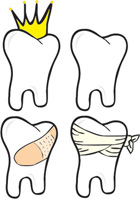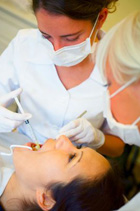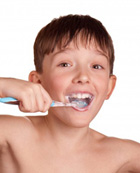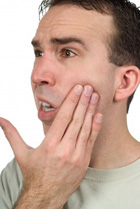 Everybody knows that eating sweet and sugary foods is bad for your teeth. This is because they contain starch, which reacts with plaque acid to speed up the process of enamel erosion. It is also because sugary foods are often very sticky and cling to the teeth and get caught in small gaps in the mouth. If you do not rinse your mouth with water or brush your teeth soon after eating, the sugar will sit on the teeth causing damage. This will eventually begin to cause cavities, which are small holes that start to appear in the protective enamel. If this is not repaired it will eventually be breached and expose the soft, sensitive inner parts of the teeth top bacteria and infection. Not only will this be painful, as the bacteria will attack the dental nerve, but it could also result in lost teeth and the need for further complicated and unpleasant dental treatment.
Everybody knows that eating sweet and sugary foods is bad for your teeth. This is because they contain starch, which reacts with plaque acid to speed up the process of enamel erosion. It is also because sugary foods are often very sticky and cling to the teeth and get caught in small gaps in the mouth. If you do not rinse your mouth with water or brush your teeth soon after eating, the sugar will sit on the teeth causing damage. This will eventually begin to cause cavities, which are small holes that start to appear in the protective enamel. If this is not repaired it will eventually be breached and expose the soft, sensitive inner parts of the teeth top bacteria and infection. Not only will this be painful, as the bacteria will attack the dental nerve, but it could also result in lost teeth and the need for further complicated and unpleasant dental treatment.
It is therefore important to make sure you and your family are not eating more sugary foods than is safe to do so. Obviously sugary foods are fine in small amounts. We all deserve a treat once in a while and if you have kids it is more or less impossible trying to keep them away from chocolate and sweets. However, there are measures you can take to limit the amount of bad sugar they are getting but still giving them sweets.
Fruit contains sugar, but of a different less damaging and natural kind. This means that fruits like grapes and strawberries are ideal sweet treats. Dried fruit like raisins and apricots are also perfect for treating the sweet tooth but not causing any unnecessary damage. Dentists in Central Leeds are able to provide you with much more information about which foods are the most damaging to your teeth and what possible substitutes there are to replace them.





 Dental emergencies can be extremely traumatic, especially as they are usually accompanied by a great deal of pain. We are all intrinsically aware of how important our teeth are, both to our appearance and the way we are able to lead our lives, so it can be very stressful when something bad happens to our teeth.
Dental emergencies can be extremely traumatic, especially as they are usually accompanied by a great deal of pain. We are all intrinsically aware of how important our teeth are, both to our appearance and the way we are able to lead our lives, so it can be very stressful when something bad happens to our teeth. The two most common problems that affect the health of our teeth are tooth decay and gum disease. Tooth decay is when plaque acid has eroded the protective layer of enamel, exposing the more sensitive central part of the tooth to bacteria and infection. This can result in painful and unpleasant complications and expensive root canal and crown treatment. Most early decay is addressed by fillings, which most people will experience during their lifetime.
The two most common problems that affect the health of our teeth are tooth decay and gum disease. Tooth decay is when plaque acid has eroded the protective layer of enamel, exposing the more sensitive central part of the tooth to bacteria and infection. This can result in painful and unpleasant complications and expensive root canal and crown treatment. Most early decay is addressed by fillings, which most people will experience during their lifetime. It seems fairly obvious to most people that looking after the health of their teeth and gums is very important. We all know that good oral hygiene can help to keep the teeth and gums free of plaque and bacteria, and that this will prevent dental problems but recent research has shown there may be a much more significant reason to keep our oral hygiene at a very high level.
It seems fairly obvious to most people that looking after the health of their teeth and gums is very important. We all know that good oral hygiene can help to keep the teeth and gums free of plaque and bacteria, and that this will prevent dental problems but recent research has shown there may be a much more significant reason to keep our oral hygiene at a very high level. Judging by the increasing number of people in the UK who are suffering from dental cavities and gum disease, it would seem that the standards of oral hygiene are slipping. This is more than likely due to complacency when it comes to oral hygiene or even an ignorance of exactly what it takes to care for your teeth properly.
Judging by the increasing number of people in the UK who are suffering from dental cavities and gum disease, it would seem that the standards of oral hygiene are slipping. This is more than likely due to complacency when it comes to oral hygiene or even an ignorance of exactly what it takes to care for your teeth properly. Everyone has heard the word plaque countless times in adverts for dental products but how many people actually really understand what it is and why it is so dangerous for your teeth? Plaque is a filmy substance comprised of bacteria and decaying food debris that clings to the surface of the teeth. As the bacteria and food decay they release chemicals, collectively known as plaque acid, which erodes the surface enamel of the teeth and also irritates gum tissue. If allowed to remain in the mouth and continually release acid, plaque can be the cause of both tooth decay and gum disease. It will also harden over time so that it cannot be removed by conventional cleaning. This hardened plaque is commonly known as tartar.
Everyone has heard the word plaque countless times in adverts for dental products but how many people actually really understand what it is and why it is so dangerous for your teeth? Plaque is a filmy substance comprised of bacteria and decaying food debris that clings to the surface of the teeth. As the bacteria and food decay they release chemicals, collectively known as plaque acid, which erodes the surface enamel of the teeth and also irritates gum tissue. If allowed to remain in the mouth and continually release acid, plaque can be the cause of both tooth decay and gum disease. It will also harden over time so that it cannot be removed by conventional cleaning. This hardened plaque is commonly known as tartar. Without the necessary dental care our teeth may be at risk from a number of dental problems. This ranges from mild tooth decay and gum disease to the more serious tooth abscess and even tooth loss. The one thing common to all these forms of dental problem is the pain that accompanies them. Even a mild gum disease could be responsible for causing irritation and pain and the more serious the problem, the more likely it is to cause significant pain.
Without the necessary dental care our teeth may be at risk from a number of dental problems. This ranges from mild tooth decay and gum disease to the more serious tooth abscess and even tooth loss. The one thing common to all these forms of dental problem is the pain that accompanies them. Even a mild gum disease could be responsible for causing irritation and pain and the more serious the problem, the more likely it is to cause significant pain. You cannot underestimate the role of the parents in good dental care for children. Just as for adults, City of Leeds dentist recommend regular check ups for children, ranging from between every three to six months, starting even before the teeth have begun to emerge. But it is the parents’ actions at home that will have the biggest impact on the dental health of their children. And furthermore, it is not just in the short term but the care you provide for your child’s oral health can affect their teeth for the rest of their lives.
You cannot underestimate the role of the parents in good dental care for children. Just as for adults, City of Leeds dentist recommend regular check ups for children, ranging from between every three to six months, starting even before the teeth have begun to emerge. But it is the parents’ actions at home that will have the biggest impact on the dental health of their children. And furthermore, it is not just in the short term but the care you provide for your child’s oral health can affect their teeth for the rest of their lives. Of all the lifestyle choices we make that can be bad for our teeth, smoking is one of the most damaging. We all know about the wider health implications of smoking but few smokers are fully aware of the damage they may be doing to their teeth and gums.
Of all the lifestyle choices we make that can be bad for our teeth, smoking is one of the most damaging. We all know about the wider health implications of smoking but few smokers are fully aware of the damage they may be doing to their teeth and gums. What we eat can have a big impact on the health of our teeth. Diets are very much in the news at the moment because of health concerns over obesity but it is also worth remembering that poor diets are also very bad for your teeth. At a time when the number of dental cavities and instances of gum disease are once again on the rise in the UK it is very important that we look carefully at what we eat, especially our children, in order to keep our teeth as healthy as possible.
What we eat can have a big impact on the health of our teeth. Diets are very much in the news at the moment because of health concerns over obesity but it is also worth remembering that poor diets are also very bad for your teeth. At a time when the number of dental cavities and instances of gum disease are once again on the rise in the UK it is very important that we look carefully at what we eat, especially our children, in order to keep our teeth as healthy as possible.

